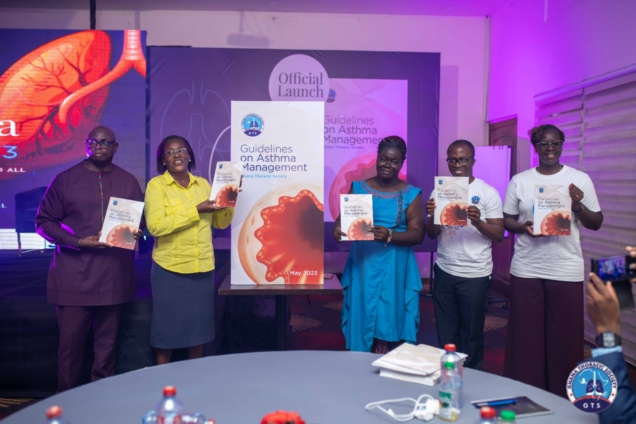The Ghana Thoracic Society (GTS) has unveiled the National Asthma Guidelines, to provide a uniform approach to asthma diagnosis and guide disease treatment and management in Ghana for better patient outcomes.
The Asthma Guidelines was launched on May 2, in Accra to commemorate World Asthma Day and to create awareness and knowledge of asthma, enhance illness treatment, and lessen the disease's impact.
Dr Clement Laryea, President of the Ghana Thoracic Society (GTS), said the development of the document is the outcome of significant study and cooperation among healthcare experts and stakeholders in the nation to offer clear and comprehensive advice for diagnosing, treating, and managing asthma in adults and children alike.
According to Dr Clement Laryea, Asthma is a major public health issue in Ghana, and its prevalence is rising.
"Creating this guideline is an important step towards better asthma treatment and lowering the burden of asthma on people, families, and the healthcare system.

"We believe the manual will provide medical professionals with the tools they need to improve asthma treatment in Ghana and, as a result, the quality of life for people with asthma."
Dr Laryea assured that the guideline covers all aspects of asthma care, from initial diagnosis and assessment to ongoing management and follow-up.
It also includes medication recommendations, including inhaled corticosteroids, bronchodilators, and oral medications.
Asthma is a chronic respiratory condition affecting millions of individuals throughout the globe, including Ghana. Available records from the World Health Organisation (WHO) indicate that over three million Ghanaians suffer from asthma, which, if left untreated, may cause severe morbidity and death.
Asthma care is critical for preventing and controlling symptoms, improving quality of life, and lowering the risk of severe asthma episodes.
The new guideline also emphasises the importance of patient education, self-management strategies, and all aspects of asthma care, from initial diagnosis and assessment to ongoing management and follow-up, such as avoiding triggers and maintaining a healthy lifestyle.
The GTS hopes that the guideline will improve the quality of care for asthma patients in Ghana and reduce the burden of the disease on individuals, families, and society as a whole.
The GTS, through the Ghana Health Service and the Health Ministry will disseminate the guidelines to healthcare professionals nationwide and provide training on its implementation.
The society also plans to work with policymakers to ensure the guideline is integrated into national health policies and programs.
Latest Stories
-
GSTEP 2025 Challenge: Organisers seek to support gov’t efforts to tackle youth unemployment
18 minutes -
Apaak assures of efforts to avert SHS food shortages as gov’t engages CHASS, ministry on Monday
41 minutes -
Invasion of state institutions: A result of mistrust in Akufo-Addo’s gov’t ?
58 minutes -
Navigating Narratives: The divergent paths of Western and Ghanaian media
1 hour -
Akufo-Addo consulted Council of State; it was decided the people won’t be pardoned – Former Dep. AG
1 hour -
People want to see a president deliver to their satisfaction – Joyce Bawah
2 hours -
Presidents should have no business in pardoning people – Prof Abotsi
2 hours -
Samuel Addo Otoo pops up for Ashanti Regional Minister
2 hours -
Not every ministry needs a minister – Joyce Bawa
2 hours -
Police shouldn’t wait for President’s directive to investigate election-related deaths – Kwaku Asare
3 hours -
Mahama was intentional in repairing ties with neighbouring countries – Barker-Vormawor
3 hours -
Mahama decouples Youth and Sports Ministry, to create Sports and Recreation Ministry
3 hours -
Mahama’s open endorsement of Bagbin needless – Rabi Salifu
4 hours -
Police station torched as Ejura youth clash with officers
4 hours -
If Ibrahim Traoré goes civilian, it may be because of Mahama’s inauguration – Prof Abotsi
5 hours

